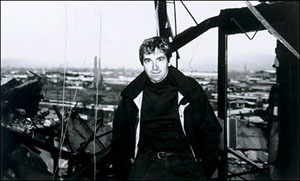|
|
 Gjelten stands in the ruins of Oslobodjenje, Sarajevo's surviving newspaper, 1993. Gjelten shares his thoughts about the state of diplomacy and stories from abroad in this informal interview with MPR writer Bryce Eberhart. Is there a political powder keg that's not getting a lot of attention from international media right now? If it's not in the news, I guess that rules out Kosovo and Macedonia which are in the news. Aside from that, Cyprus is on the verge of becoming a very dangerous situation. Cyprus is divided between a Turkish and a Greek side. The Turkish forces there are talking about bringing in some sophisticated weaponry they haven't had there before. The Greek side, who is recognized internationally as the legal government of Cyprus wants to join the European Union and they've been invited to. If that goes through, the Turks have threatened to beef up their military presence on the island. There have been clashes many times before over the last thirty years between the Greeks and the Turks on Cyprus, and that could flare up in a moment. That's a very dangerous situation because if there is real fighting there, Turkey would come in on the side of the Turkish Cypriots, and Greece would come in on the side of the Greek Cypriots, and you'd have a conflict between two members of NATO. How has being in the field made you a better reporter in the State Department? Knowing what the situation really is like puts you in a much better situation to report what they say because you can be a little bit of a check on them. You go to a State Department briefing every day at 12:30 p.m. and the spokesman gives you a speech on the situation in Bosnia for example. If you haven't been there, you more or less have to take his word for it. If you've been there, you more quickly pick out the flaws in what he is saying and it's much easier to come up with a tough question for him because you know the weak points of the policy because you have seen it implemented on the ground. What is the state of diplomacy in the United States? I have a general impression that the art or craft of diplomacy has suffered in the last 20 years. I know that the state of morale in the Foreign Service is low. Foreign Service officers are career professional diplomats who take the responsibilities seriously, who believe in representing the United States and U.S. interests abroad and working for better international relations. But often they are sidelined by the political appointees who get named to senior diplomatic posts because of their connections, friendships, or even their record of campaign contributions. We have seen presidents - Republican and Democrat alike - dole out ambassadorships as rewards for political loyalty or financial support. Recently, we have also seen verbal assaults from Congress on "State Department bureaucrats" and "briefcase-toting diplomats," and the Foreign Service budget has come under constant attack. Is there a particular diplomat that really sticks out in your mind as exceptional? I'd like to see more tribute given to people like Robert Frasure, the diplomat who was killed in August 1995 outside Sarajevo when the armored personnel carrier in which he was riding slid off a dirt road on a mountainside. Frasure for the previous several months had been working slowly and patiently but effectively to lay the foundation for a peace agreement in Sarajevo. Ultimately the agreement was negotiated at Dayton with much fanfare, but it would not have been possible without the painstaking efforts of people like Frasure. In the current atmosphere of State Department-bashing on Capitol Hill, people like Frasure don't get the recognition they deserve. This cannot make foreign service more attractive to young, bright people. Did you know Robert Frasure? I met him and talked to him. When you come to the State Department you need to cultivate sources who may not be the main news makers but they're a good source of information. When I was doing Bosnia, I couldn't just ring up Richard Holbrook on the phone and get him to give me a background analysis on diplomacy. Frasure was a very candid, thoughtful, helpful guy. Two or three weeks before he was killed I was working on a story. He talked in a down-to-earth kind of way. You could never quote him by name, but you could quote him as a senior State Department official. He was the kind of guy that instead of giving you the official line, he gave you the actual situation. You're married to NPR's Pentagon Correspondent Martha Raddatz. What is your working relationship? In my Rolodex I have a card with Pentagon numbers on it, and I have turned that card over so the blank side faces me, and I wrote on the back, "See Martha first." We sort of have a deal between us that I don't call people at the Pentagon and she doesn't call people at the State Department unless we check with each other first. So if I'm working on a story and need to follow it up at the Pentagon, I ask her if she would like to make a call on my behalf or if she will let me make it. She does the same thing if she has a question for someone at the State Department. Many stories have both a State Department and Pentagon angle and you can't always split them down the middle, so we have to have a cooperative approach. |
